Seinfeld
(For optimum viewing, adjust the zoom level of your browser to 125%.)
Season One (1989-90)
Rate:
3 out of 5
Viewed:
7/20
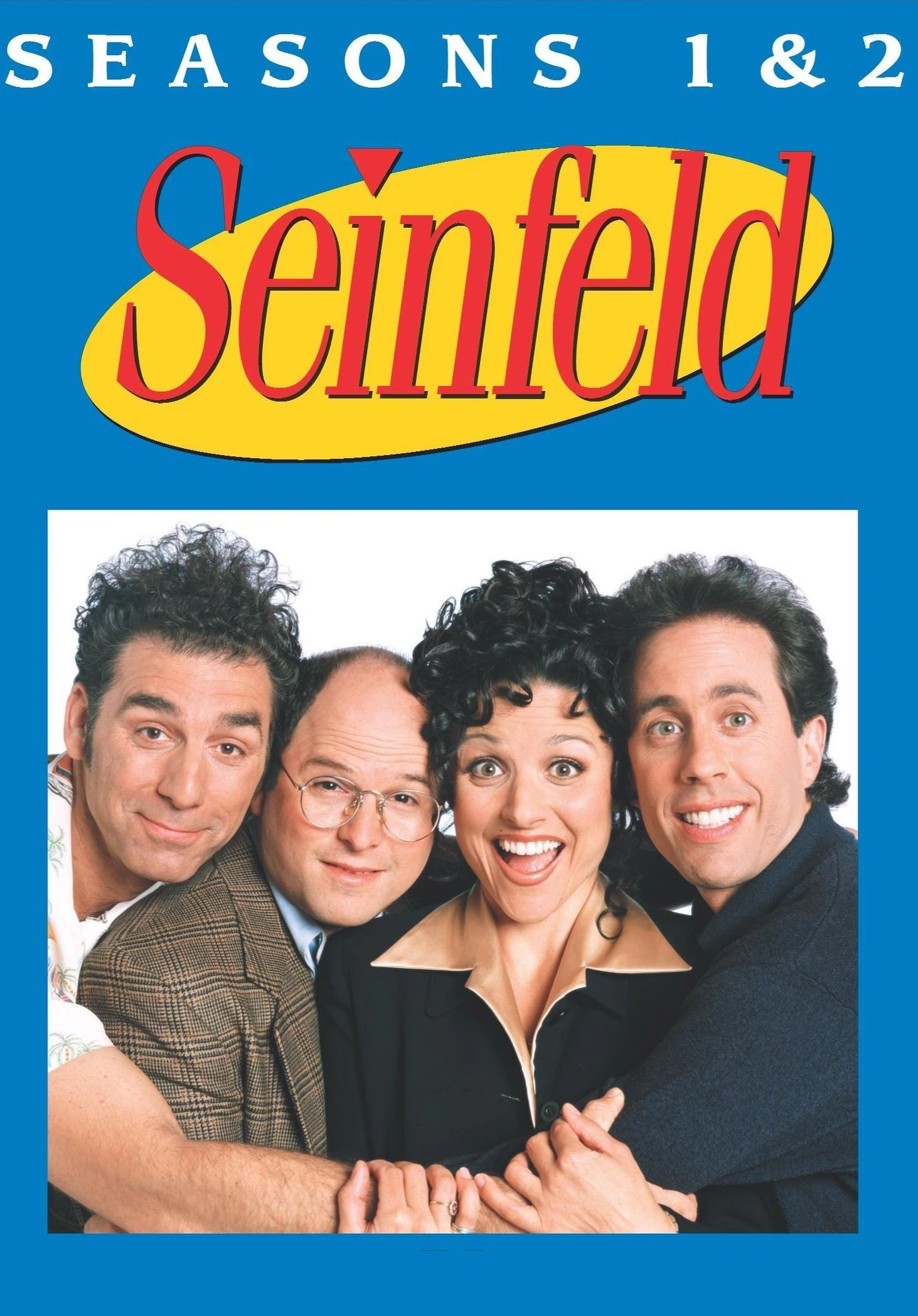
10/24:
There's no doubt that Seinfeld is a work of genius.
The reruns will never be old because of many reasons. Most importantly, they demonstrate how relatable
the content is to the quotidian real life with the same complaints about how the real world is run by weird
unwritten societal rules.
When Seinfeld finally caught the public's eye by large during the fifth season or so (the show was
actually never in the top 25 during the first four seasons except for the last one which barely cracked the
list), it started to become overrated and was somewhat not the same anymore.
People were saying, "Wow! Seinfeld is so good!" when I was like, "Duh..." By the eighth season, the show
grew worse as everybody including New York City ate it up and thought it was the greatest thing ever since
sliced bread.
Brandon Tartikoff, who was probably the most important figure at NBC, personally feared that the show might be "too
Jewish, too New York." I agree with him on both counts but feel more strongly on the latter which becomes
pronounced during the last three or four seasons.
As for Season One, it's unfortunately not that great because the comedy is often inconsistent although Jerry's
stand-up routine is quite good. I'll like to think of this season as "everybody trying to find his way" in terms
of what works and doesn't work.
Here's my analysis for some of the following episodes:
The Seinfeld Chronicles: NBC decided to cancel the show after the test audience reacted extremely negative
to this pilot episode. Imagine that because many trademarks used went on to be applied in subsequent episodes for
much of the series' existence. Happily, the execs changed their minds.
In the meanwhile, I find it funny when Kessler (who's renamed Kramer after this episode) prophetically said he
was that "close to being a lawyer" as demonstrated by his thumb and forefinger because Michael Richards faked
his way in Trial and Error years later.
Speaking of Michael Richards, let's look back on his movie career. I remember how stupid his physical comedy was
and how lame he looked doing it. When Michael Richards became Kramer and played his role to perfection, he earned
the title as the greatest TV character ever although he reminded me of Ed Norton in The Honeymooners.
Jerry Seinfeld couldn't have said it better when he described Kramer as either a "valueless lump of refuse" or
an "incredible Zen master." Anyway, where did Kramer get the money to sustain his life without ever working for
so long?
During the audition, Tony Shalhoub almost won the part of Kramer, but it's a good thing that he didn't because
I can't see him playing Kramer. Thankfully, he became Antonio the cabbie driver in Wings and was very funny.
The Stake Out: Julia Louis-Dreyfus makes her first appearance as Elaine Benes after replacing Lee Garlington
who played the waitress. Believe it or not, it was the best move ever for the sake of the show's survival.
Male Unbonding: This is the only episode, which looks old as it's the second ever shot, in the history of
Seinfeld with a title that doesn't begin with the article "the."
Season Two (1991)
Rate:
3 out of 5
Viewed:
7/20

7/20:
Season Two isn't what I call a great one, because it's not consistently funny, but is slowly improving to what
it'll become.
Sometimes, I think Jerry's stand-up act is better than the rest of the episode which seems slow. I realize by now
that it's the moments that make the show memorable and what it is, but a completely funny episode is very rare and
almost never happens.
Here's my analysis for some of the following episodes:
The Pony Remark: It's one of the most memorable because of Jerry's conversation killer when he
said that he hated any kid who had a pony and Manya got all forceful about it. Then, to cap it off after she
left the table, he tried hard to get anyone to agree with him. Not letting it go at the end, Jerry had a final
comment about it, "Who figures an immigrant's going to have a pony?" invoking Julia's genuine surprise laugh. By
the way, this is when the writing started to get better, finally putting Seinfeld in the classic sitcom
territory.
The Jacket: Lawrence Tierney as Alton Benes is one of the top three characters ever in a cameo on
Seinfeld although it's his only appearance. The only thing that surprised me is they hired him in the
first place for a comedy show. Why, I've never seen Lawrence Tierney smile in anything. He was probably the most
notorious tough guy back then with an extremely intimidating presence. Look no further than
Born to Kill and Dillinger. By
the way, it's a nice-looking jacket but, of course, the pink lining has to go.
The Baby Shower: It's obviously one of the funniest episodes of all time as many things happen at once,
hence the screwball effect. Ironically, as George had planned to stand up to his former date, Jerry was the one
who got crushed by someone in the same vein with so much hilarity. That's the best part ever.
The Chinese Restaurant: This is among all-time greatest episodes in TV history. Just pure Seinfeld.
However, it's strange not seeing Kramer there.
The Deal: Jerry can do better than Elaine.
Season Three (1991-92)
Rate:
4 out of 5
Viewed:
7/20
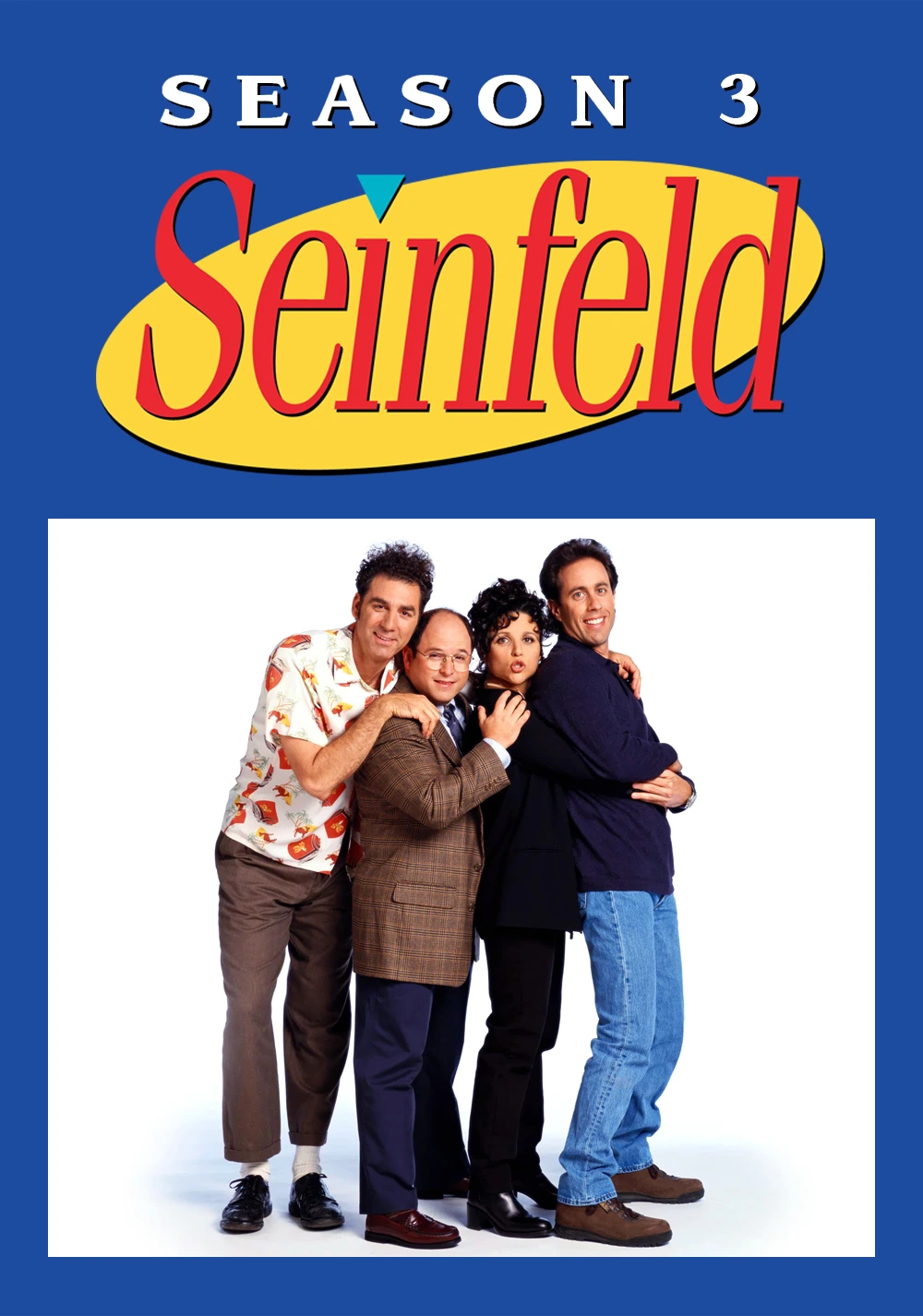
7/20:
Season Three has the show hitting its stride, yet many episodes aren't thoroughly funny while Jerry's
stand-up comedy has to go.
However, the jokes are much improved now, and there are more classic moments than before which have made the
show as it is with a few of them legendary, having become part of television history. Oddly, a recurring
theme is how expensive Jerry's friends are, costing him tens of thousands of dollars.
Here's my analysis for some of the following episodes:
The Note: George finally admits the truth: he has been a closet homosexual all along. That's why the poor
loser has a secret crush on Jerry and keeps hanging out with him.
The Truth: My favorite line from George is when he yelled, "When I was working, I spent, baby!" When
Jerry said, "Those brave Krakatoans, east of Java, who sacrificed so much for so long!", he meant the
volcanic eruption on Krakatoa from May 20 to October 21 of 1883 which was covered in a film called
Krakatoa, East of Java.
The Pen: Jerry's parents are annoying. It's the same routine they do, saying that nothing bothers them when
everything really does. There's a Brando stroke of genius when Elaine yells for Stella while Jerry's eyes
are ready to be popped out as if they're on springs. By the way, Liz Sheridan, who plays Jerry's mother, used
to be in a romantic relationship with James Dean.
The Dog: Why not buy a crate, put the dog in it, and send the bill to the drunkard? Or better yet, put the
dog in the kennel and then send the bill?
The Library: It's a great, noirish episode with a memorable performance by Philip Baker Hall as Mr.
Bookman.
The Parking Garage: I consider this episode to be in the top three of all time in Seinfeld history
because it's so good. However, the set-up can be distracting at times because there are many things going on.
At the same time, I keep looking at the mirrors in the background and the colored sheets of paper with the numbers
written on them. No matter what, it's just a brilliantly directed episode with tons of creativity that's pure
Seinfeld.
The Tape: I've always felt that George and Elaine belong together, and I hate them both. Only if George
had more confidence and wasn't such a loser, it would probably work.
The Alternate Side: Interestingly, Julia Louis-Dreyfus ended up being in a 1997 Woody Allen film called
Deconstructing Harry.
The Red Dot: You know what? If I can't see the red dot from a distance, then what's the problem? Hence,
this episode bothers me. The cleaning lady's cashmere story is crazy melodramatic.
The Subway: Jerry makes an allusion to Willy/Biff Loman to describe George. Ever since then, it has stayed
stuck in my mind because it's exactly what I think of him: a fucking loser. Also, increasingly, George is showing
the kind of pathological liar that he is. Also, he's very manic depressive, not being able to contain his emotions,
and is always having angry outbursts. As a result, George needs to be on medication to chill the fuck out.
The Suicide: Like the make-your-own pizza pie idea, Kramer's beach cologne will reappear later, and it's
not a bad idea at all. Wayne Knight makes his first appearance as Newman who could've had his own TV show.
The Boyfriend: One of the most famous episodes in Seinfeld history, Wayne Knight reenacts what he
did in JFK.
The Limo: It's a great episode that's highly reliant on creativity, but Jerry looks too Jewish to pass for
a Nazi.
The Letter: This is the one that Kramer has his portrait done which looks okay.
The Parking Space: I have to side with Mike Moffitt because George took forever in his attempt to park
the car.
The Keys: If Kramer left the show and never came back, that's the end of Seinfeld. In fact, if
he never existed, I highly doubt the show would've lasted this long or be memorable at all.
Season Four (1992-93)
Rate:
3 out of 5
Viewed:
7/21
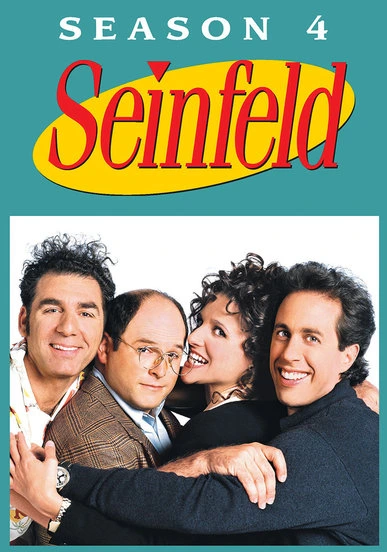
7/21:
Many episodes are funny or well-done with plenty of memorable lines and moments that are legendary but not
The Contest.
However, it becomes boring during the final third of the season; just about all, especially the finale,
are terrible which is an indication that the writers have run out of interesting material. Even Jerry sucks.
Old and stale, Jerry's stand-up comedy should be altogether eliminated. Increasingly, I've been noticing the
prevalence of product placements. So, everybody's trying to make some extra money on the side, hm?
George has gotten to be annoying, and he complains a lot and thinks he knows everything. I don't know why Jerry puts
up with him. What are the odds of them meeting beautiful women more often than not? And what is the total number
of sex partners each of the four characters has had in his or her lifetime?
Here's my analysis for some of the following episodes:
The Pitch/The Ticket: It's a brilliant episode that captures what Seinfeld is all about in a nutshell.
The line about Neville Chamberlain is a great one because that's exactly what he did, setting off WWII. Another
is when Jerry told a telemarketer off about how he felt about being called at home for a sales pitch. Susan
should've wished that she never consented to the date with George because he's the single reason for so many
terrible things that have happened to her.
The Wallet: This is one of the worst episodes in Seinfeld history. Jerry's parents, especially his
father, are grating and difficult to bear. George is too much to stand, too. He's just a fucking loser.
The Bubble Boy: It's a memorable one for the Moors/Moops misprint during the game of Trivial Pursuit.
Even more so is when Jerry was handed a piece of napkin and wiped his mouth with it when listening to the sob story.
It's the best description of who Jerry is. On the other hand, I didn't think it was funny when the log cabin burned
down.
The Contest: It's the most overrated episode of all time. The more seasons I watch, the more I realize that
sex has to be the center of conversations. I just don't see why there's sex constantly for Seinfeld
to be funny. "The Parking Garage" had none. Neither did "The Limo" nor "The Chinese Restaurant." That's the
trouble with comedy nowadays because there's too much focus on sex. I was in complete agreement with Marla about
how disgusting Jerry and his friends were. Really, she hit the right note. By the way, John Kennedy, Jr., was an
overrated figure who had accomplished nothing of significance. Even putting the "F" between his first and last
names was going too far.
The Airport: This one is so much better than the previous episode. The shot of Kramer running alongside the
moving airplane is too funny. The treatment of the passengers as first class and second class reminds me of what
occurred on the Titanic.
The Pick: The reference to The Elephant Man is well-done.
The Implant: Two famous quotes are uttered by Kramer and Sidra (Teri Hatcher) in this hilarious double-dip
episode: "It's like a sauna in here" and "They're real...and they're spectacular."
The Pilot: What difference does it make whether or not the fake Kramer stole a box of raisins? Anyway,
the pilot is terrible, and so is the season finale. Often, Seinfeld has been called a "show about nothing"
when in fact it's about shallowness, selfishness, and self-obsession.
Season Five (1993-94)
Rate:
3 out of 5
Viewed:
7/21
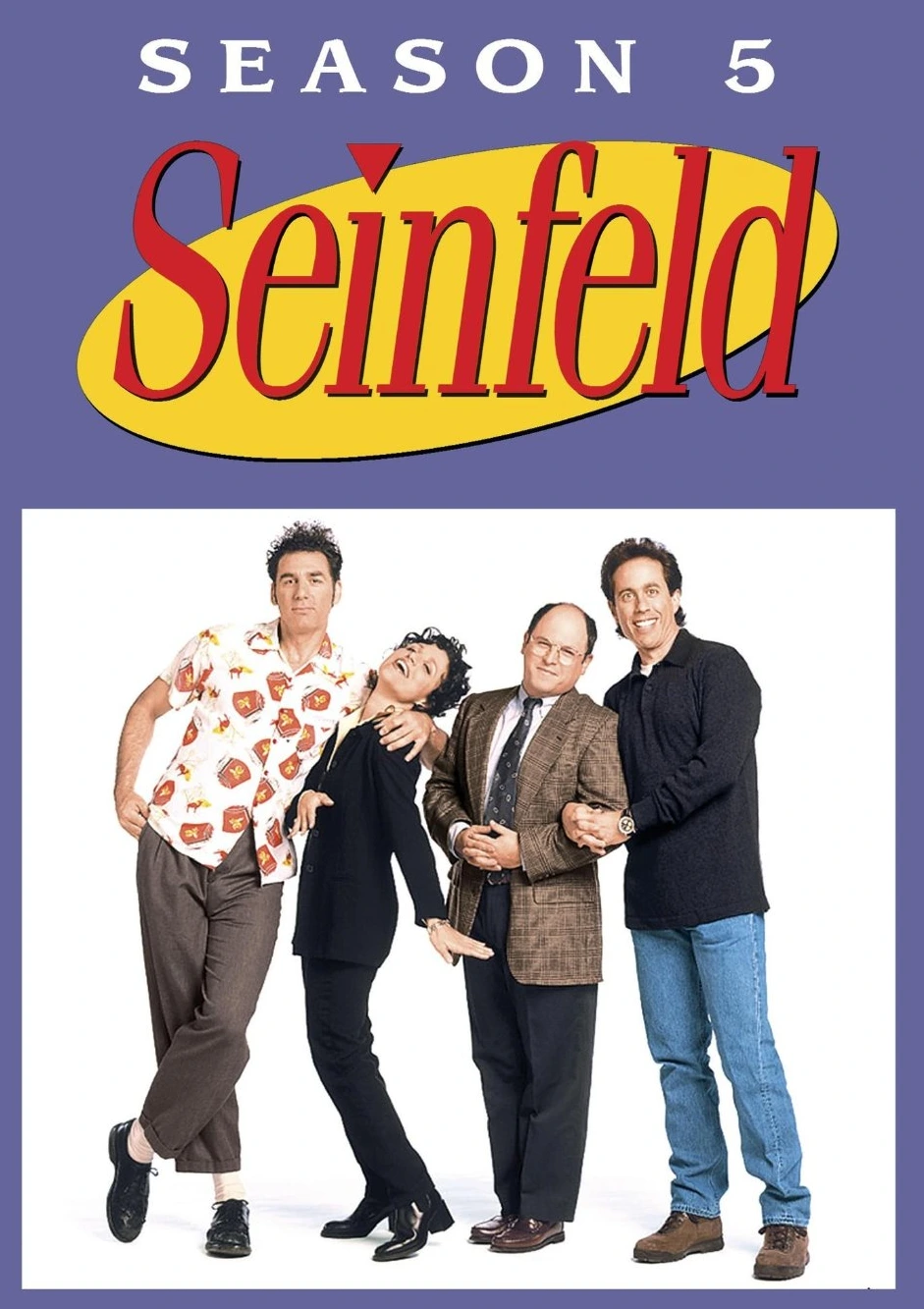
7/21:
Seinfeld has gotten worse with tons of sex and adult language.
Sometimes, it's gross. There's not much of comedy going on...just a lot of catch phrases and moments. Jerry's
stand-up is brutally unfunny. In one of them, he talks about a baby who's born with dirty glasses. The show had
genius written all over it during the first three seasons, but now, it has sunk low enough to meet the juvenile
standard.
Here's my analysis for some of the following episodes:
The Mango: At the beginning of the series, sex talk was in small portions. Now, it's incessant at a
higher frequency that's becoming old and not funny at all.
The Lip Reader: There's a good moment when Kramer clearly didn't know ASL by mistranslating most of it.
While I watched his signs, he, at one point, actually said, "Monkey dancing." Unfortunately, Marlee Matlin
perpetuates a myth that deaf people can easily read lips anywhere all the time. The truth is that most can't and
that the best of them might be able to do it well enough 30 to 40% of the time. Homophone is a classic lipreading
problem, so it's why the six/sex thing is funny which is true anyway.
The Non-Fat Yogurt: Among the worst episodes, this one didn't make me laugh once. Like sex, the level
of profanity has gone full-blown. Now, it's *bleep* this and *bleep* that like there's no tomorrow. How is this
funny? I don't get it.
The Masseuse: Again with the massage? We've been through it already. In these situations, just ask
directly and see what the response is. Great job, everybody, by making a serial killer more famous than necessary.
I don't know how much lower they can go than that. Elaine's selfishness goes to the extreme by requesting her
boyfriend to change his name. Awful.
The Cigar Store Indian: I knew Seinfeld had been a racist show all along, and this one exemplifies it.
The Stall: Notice that most of the main characters change boy/girlfriends weekly as they do with their
underwear, and they're always too good-looking. While Jerry is sanctimonious about women in general and points
out breast implants, phone sex talk, and ménage à trois, how come Jerry couldn't stay with anyone
for at least a year? As I correctly thought so in "The Note," George has been secretly gay all along. Elaine
shows her true colors as she's only interested in looks, not somebody's health after Tony had a long fall to
the bottom during rock climbing. By the way, if Jane looks familiar, that's Jami Gertz of
The Lost Boys and Less Than Zero.
The Dinner Party: Terrible, and it's a rip-off of "The Chinese Restaurant." Everybody's true colors
is showing big time.
The Pie: The suit looks ugly. As for Kramer, I bet his back is showing a huge red spot that's full of
blisters and rashes. Anyway, the episode is an homage to
Invasion of the Body Snatchers.
The Stand-In: Finally, after a long while, there's a funny episode, thanks to Danny Woodburn who's pretty
good as Mickey. Oddly, are stand-ins supposed to appear first before the actual scene will be shot?
The Wife: I can never understand why it feels awkward to bring something from outside to a restaurant
in order to enjoy the meal more. Meanwhile, the show has become more racist as Kramer shows up at the apartment of
a black family with extreme sunburn. Unsurprisingly, Michael Richards saw his reputation go down
the drain for uttering the N-word during a comedy performance in 2006. Notice that there are a few black people
during the nine-year run of Seinfeld? Usually, they're either inferior or stereotypical.
As shown with the manager at the restaurant, why does it have to be an angry black man to settle things down among
white people? Similarly, remember Babu? He and other foreign nationals are also shown either terrorists or helpless
which is a sign of the show's xenophobia. That's why I have a really hard time when it comes to putting
Seinfeld in the top 25 TV sitcoms of all time.
The Raincoats: Jerry making out with a woman during
Schindler's List is another low point of the show. I'm sure the Holocaust
victims appreciated it...not.
The Fire: No matter what Elaine says or thinks, Kramer's idea of a coffee table book about coffee tables is
genius. It can even be transformed into a coffee table. Jon Favreau of
Swingers and Made plays Eric the Clown. Speaking
of the character, Bozo the Clown was enormously popular back then, and I used to watch the show, but I doubt
many people today know who he is.
The Opposite: Yeah, Regis...I get it. Kramer is bonkos, and so is your co-host.
Season Six (1994-95)
Rate:
4 out of 5
Viewed:
12/24
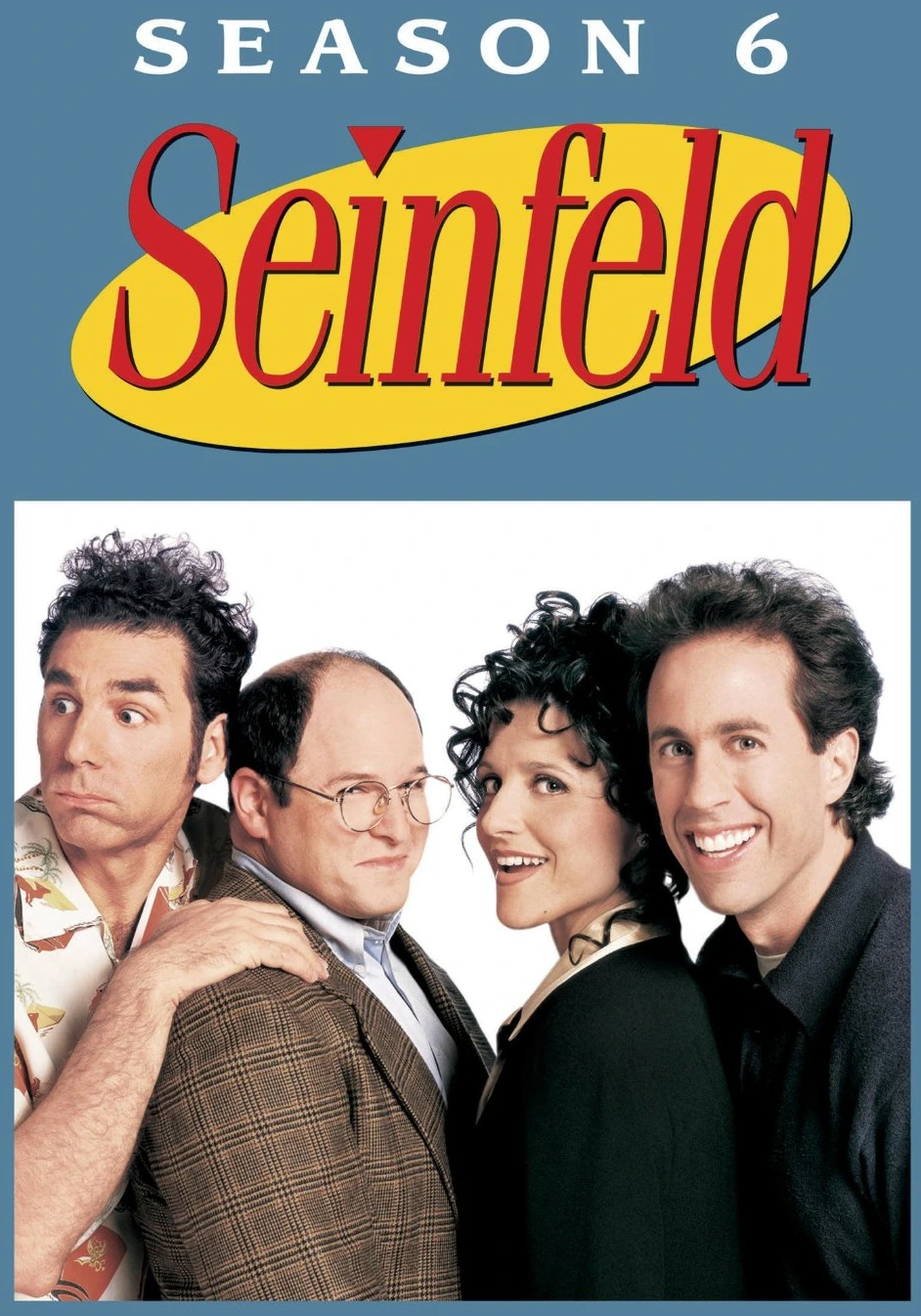
12/24:
Jerry's stand-up comedy is much better now, and the jokes are well-worded and clever.
As a matter of fact, Season Six is an improvement over the previous two, and everybody seems to be on cruise
control.
Here's my analysis for some of the following episodes:
The Chaperone: The Miss America contest represents everything wrong about the culture's
perspective of women. Thankfully, it went away not long after.
The Chinese Woman: Yeah, Donna Chang should think about changing her last name. Now, I'll like to see
somebody wearing a cape in public for real.
The Mom & Pop Store: The great Jon Voight makes a cameo appearance and has a hilarious moment with Kramer
that pays homage to Best Picture winner Midnight Cowboy.
The Scofflaw: Um...why not run the license plate through the database and get the address of the owner
of the brown Diplomat? By the way, this episode is a sort of homage to Moby Dick. George's new hair looks
great, so I don't agree with Jerry.
The Highlights of 100: This one perfectly encapsulates all problems with the show: too much focus on
sex. At least, the catch phrases are very good, being the primary reason why Seinfeld is a work of genius.
The Jimmy: It's one of the more memorable episodes because of Jimmy's third-person talk of which I can never
forget. It's unusual and different. George will copy this for the following seasons. On the other hand, Jerry is a
hypocrite when he's shown disgusted by the placement of porn literature in the dentist's office, yet he dates a
different woman almost weekly.
The Understudy: I hate Bette Midler, and I hate the movie Beaches.
Season Seven (1995-96)
Rate:
3 out of 5
Viewed:
12/24
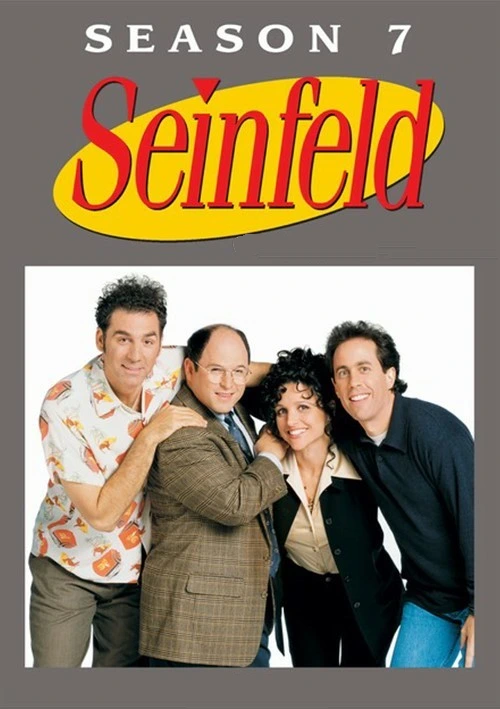
12/24:
Season 7 is the beginning of the end.
How do I know? It starts with Elaine who can't stop getting on my nerves constantly. She wants to look perfect
which has become a distraction, especially her ever-white teeth. Ever notice the pale circles around her eyes?
Plus, Jerry's stand-up comedy sucks and needs to be thrown out of the show.
Anyway, Seinfeld worked the best when the four main characters were being themselves in the most normal way
possible, hence the legendary episodes: "The Chinese Restaurant" and "The Parking Garage."
Here's my analysis for some of the following episodes:
The Postponement: The babbling rabbi is sure something else, huh? Like I've said before, George and Elaine
are meant to be together. As for Susan, it'll be the biggest mistake of her life by agreeing to marry George or even
seeing him again.
The Maestro: I looked up the internet to see if there were any places in Toscany available for rent or sale,
and it turned out to be thousands of them. Hence, the "Maestro" was wrong.
The Soup Nazi: This character is one of the most memorable. Then again, racism and xenophobia are
at work here as it has been done in many episodes. Look at how many black characters are portrayed; they're
either weak, stupid, angry, or incompetent. The Soup Nazi, who's from Argentina, is given
the same treatment just like Poppie and Babu.
The Secret Code: How can it be that the guy's jacket is stuck in the ATM?
The Sponge: Too much sex, and Elaine sucks.
The Rye: Saxophone and oral sex...gross.
The Caddy: What's the point of trying the bra on? How is that going to prove anything? Women
wear it. Duh.
The Cadillac: This one is a boring overlong episode. At the end, Morty Seinfeld copies
off Richard Nixon's disgraced exit on the helicopter. By the way, why would Marisa Tomei be interested in
an all-time loser like George Costanza?
The Calzone: What's so goddamned important about George Steinbrenner? Get rid of him already.
The Bottle Deposit: Kramer and Newman's stupid plan doesn't make sense. Ask yourself this: if the homeless
people collect cans and bottles regularly, what do they do with them? Bingo. Meanwhile,
just call the cops to report the stolen car and its whereabouts; it's not complicated.
The Invitations: That's it: the worst episode in Seinfeld history that killed the
whole thing for me. I didn't find it funny that the four main characters were flippant about Susan's death.
Hence, they're pyschopaths.
Season Eight (1996-97)
Rate:
3 out of 5
Viewed:
12/24
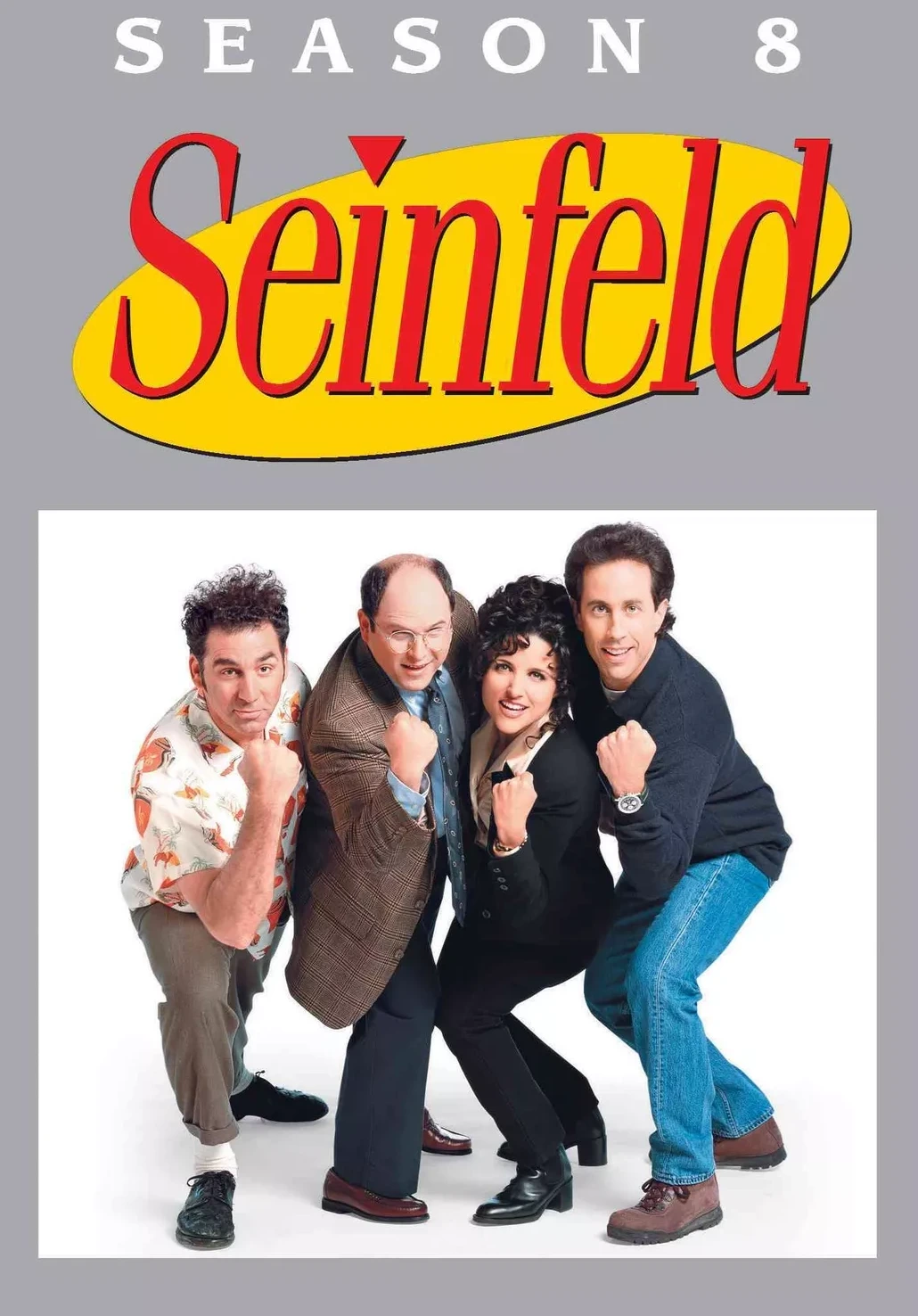
12/24:
Season 8 may be off to a good start, but it becomes worse when I see the artificialness that wasn't
there in the past and finishes as the worst season ever.
There are numerous unnatural, forced situations. I'll say that co-founder Larry David's departure had a lot to do
with the drastic change in tone. At least, they've gotten rid of Jerry's stand-up comedy, but the opening scene
stinks.
Here's my analysis for some of the following episodes:
The Soul Mate: Two employees recently passed away: Marjorie Gross and Victor Wayne Harris.
But who the fuck cares? Now, you see what I mean when I said Susan's death wasn't funny? Moving on...
The Chicken Roaster: J. Peterman copies Marlon Brando's famous skit in
Apocalypse Now.
The Abstinence: It took nine episodes into this season for them to talk about sex again. How pathetic
when everything was going well.
The English Patient: For once, I agree with Elaine that
The English Patient sucked.
The Muffin Tops: Newman becomes Winston Wolf, played by Harvey Keitel in
Pulp Fiction, while Jerry probably tries to channel what Jack Nicholson
did in Wolf. Now, that makes it two "Wolf"s.
The Summer of George: What a terrible season finale. Season Nine can't come any sooner, so I can be
done with the show for good.
Season Nine (1997-98)
Rate:
4 out of 5
Viewed:
3/25
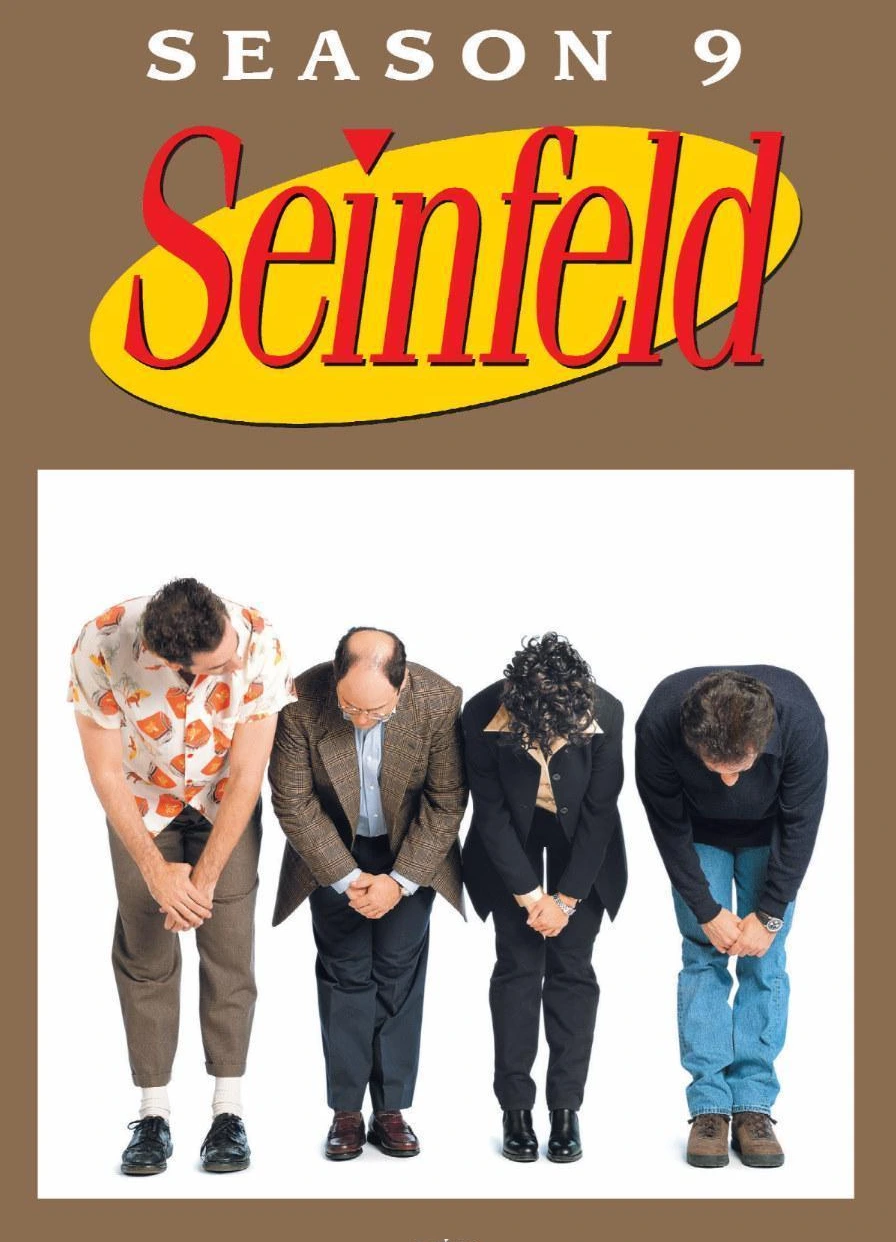
3/25:
That's it...this is the final season.
I give the show one thing: it's been remarkably strong in quality for nine seasons altogether. However, the
episodes during the last two seasons have gotten stupider and stupider while capturing the "pop" feel.
At the same time, there are too much sex, racism, and selfishness involved.
But really...what happened to the genius that made "The Chinese Restaurant" and "The Parking Garage" so good?
Nonetheless, I've said this before and will say it again: there's no Seinfeld without Michael Richards.
As Kramer, he's the best, period.
Here's my analysis for some of the following episodes:
The Butter Shave: The book Newman was reading is based on the plane crash into the Andes mountains
from October 13 to December 23, 1972, which got made as a movie called Alive
in 1993.
The Serenity Now: It's what I thought: Elaine is a whore. She even dresses and looks like it.
The Blood: Yep, that's Jerry's worst nightmare: becoming blood brothers with Kramer and Newman.
The Merv Griffin Show: It's a good one with Kramer.
The Slicer: Why not let the landlord know that the cat was left alone in the apartment? And use
a pair of shoes to hold up the paper clip before putting it in the power socket?
The Betrayal: It's not a well-done episode due to the omission of details while going backwards. By
the way, why the closing credits at the end when it should've been shown from the get-go?
The Apology: That's what George is: a rageaholic.
The Strike: Women wearing makeup is the number one reason to cover up the fact that they're ugly to
begin with. It frequently happens with celebrities. If you don't believe me, just search any actress on
the internet, especially Julia Louis-Dreyfus, and see what she looks like without makeup.
The Dealership: What Jerry and Puddy were talking about is in reference to
Koko: A Talking Gorilla. The name will be repeated in
"The Maid," but it's not funny and is rather demeaning to the actual gorilla.
The Cartoon: I've been saying it all along: George is secretly in love with Jerry.
The Wizard: What a dumb episode that shouldn't have been aired in the first place. I never
thought Elaine was Hispanic from the get-go.
The Puerto Rican Day: Of course, they don't care; that's why the Isaraeli flag wasn't burned.
The Chronicle: What's the point? They did this before in "The Highlights of 100."
The Finale: Well-done. I don't know why people didn't like the series finale; I thought it returned
to the same roots that made the show so good. By the way, you can now see how "The Chronicle" was a mistake
because it took away the flashback effect of this episode.